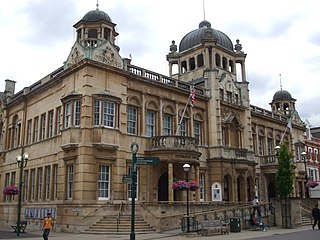
Ilford is a large town in east London, England, 9 miles (14 km) north-east of Charing Cross. Part of the London Borough of Redbridge, Ilford is within the ceremonial county of Greater London. It had a population of 168,168 in 2011, compared to 303,858 for the entire borough.
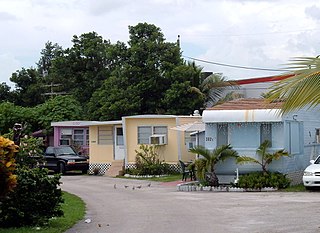
A trailer park, caravan park, mobile home park, mobile home community or manufactured home community is a temporary or permanent area for mobile homes and travel trailers. Advantages include low cost compared to other housing, and quick and easy moving to a new area.

Lakeview, also spelled Lake View, is one of the 77 community areas of Chicago, Illinois. Lakeview is located in the city's North Side. It is bordered by West Diversey Parkway on the south, West Irving Park Road on the north, North Ravenswood Avenue on the west, and the shore of Lake Michigan on the east. The Uptown community area is to Lakeview's north, Lincoln Square to its northwest, North Center to its west, and Lincoln Park to its south. The 2020 population of Lakeview was 103,050 residents, making it the second largest of the Chicago community areas by population.
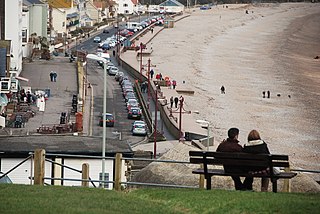
Seaton is a seaside town, fishing harbour and civil parish in East Devon on the south coast of England, between Axmouth and Beer. It faces onto Lyme Bay and is on the Dorset and East Devon Coast Jurassic Coast World Heritage Site. A sea wall provides access to the mostly shingle beach stretching for about a mile, and a small harbour, located mainly in the Axmouth area.

The Polish diaspora comprises Poles and people of Polish heritage or origin who live outside Poland. The Polish diaspora is also known in modern Polish as Polonia, the name for Poland in Latin and many Romance languages.
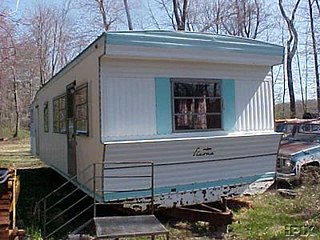
A mobile home is a prefabricated structure, built in a factory on a permanently attached chassis before being transported to site. Used as permanent homes, or for holiday or temporary accommodation, they are often left permanently or semi-permanently in one place, but can be moved, and may be required to move from time to time for legal reasons.
The Veterans Agency was an Executive Agency of the UK government's Ministry of Defence (MoD). It was amalgamated into the Service Personnel and Veterans Agency (SPVA) on 2 April 2007 under the brand Veterans-UK.
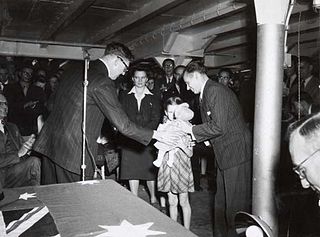
Post-war immigration to Australia deals with migration to Australia in the decades immediately following World War II, and in particular refers to the predominantly European wave of immigration which occurred between 1945 and the end of the White Australia policy in 1973. In the immediate aftermath of World War II, Ben Chifley, Prime Minister of Australia (1945–1949), established the federal Department of Immigration to administer a large-scale immigration program. Chifley commissioned a report on the subject which found that Australia was in urgent need of a larger population for the purposes of defence and development and it recommended a 1% annual increase in population through increased immigration.

Delamere Park is an English housing estate with parkland situated in Cuddington, near Northwich, Cheshire.

The Polish Resettlement Act 1947 was the first ever mass immigration legislation of the Parliament of the United Kingdom. It offered British citizenship to over 250,000 displaced Polish troops on British soil who had fought against Nazi Germany and opposed the Soviet takeover of their homeland. The act also supplied a labour force to the demands of war-torn Britain.

Duporth was situated on Porthpean Road, just outside St Austell in south Cornwall, England, UK. For over 50 years, it was a holiday resort, until its closure in 2006. The site has now been sold to private developers and now contains new houses in the traditional Cornish cottage style.

The Service Personnel and Veterans Agency (SPVA) was an executive agency of the UK Ministry of Defence. The SPVA provided personnel, pensions, welfare and support services to members of the UK Armed Forces, veterans and their dependents. It was formed on 2 April 2007 by merging the former Armed Forces Personnel Administration Agency (AFPAA) with the Veterans Agency. The agency merged in turn with Defence Business Services (DBS) on 1 April 2014.
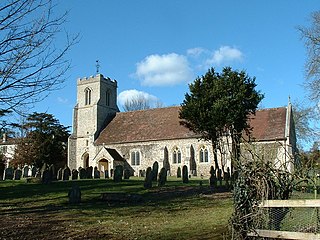
Riddlesworth is a civil parish in the English county of Norfolk. It covers an area of 8.26 km2 (3.19 sq mi) and had a population of 147 in 48 households at the 2001 census. For the purposes of local government, it falls within the district of Breckland.

The Expulsion of Poles by Nazi Germany during World War II was a massive operation consisting of the forced resettlement of over 1.7 million Poles from the territories of German-occupied Poland, with the aim of their Germanization between 1939 and 1944.

Philip Edwin Bujak is an educationalist and author. As CEO of Montessori St Nicholas Charity he was responsible for the founding of the Montessori Schools Association, the Montessori Evaluation and Accreditation Board, and was the leading voice in the drive for the creation of state funded Montessori schools.

Teigngrace is a civil parish centred on a hamlet that lies about two miles north of the town of Newton Abbot in Devon, England. According to the 2001 census, its population was 235, compared to 190 a century earlier. The western boundary of the parish mostly runs along the A382 road; its short northern boundary along the A38; and its eastern partly along the rivers Bovey and Teign. It comes to a point at its southern extremity, near Newton Abbot Racecourse. The parish is surrounded, clockwise from the north, by the parishes of Bovey Tracey, Kingsteignton, Newton Abbot and a small part of Ilsington.
Canon Andrew Konstanty Glazewski was a Polish Catholic priest, lecturer in spirituality, healer and researcher into dowsing, the Earth's magnetic field, and paranormal phenomena. He settled in Britain in 1947 after serving as chaplain to the Polish forces during World War II. From 1948 until his death he served as parish priest at Ilford Park, a settlement of Polish exiles in South Devon. His published papers examine the nature of gravity, the human field, the Earth's magnetism, the mechanics of prayer and the theory and the practice of healing. A close associate of Sir George Trevelyan, he was a co-founder of the Scientific and Medical Network.
Alfred William Best, better known as Alfie Best, is a British Romanichal businessman and philanthropist who is the current chairman of Wyldecrest Parks, a mobile home park company.

Bire Akkar is a small town in Akkar Governorate, Lebanon, close to the border with Syria.

New Zealand Force South East Asia (NZFORSEA) (1974–1989) comprised the elements of the Royal New Zealand Navy, New Zealand Army and Royal New Zealand Air Force. Much of the New Zealand military left Singapore as part of operation Kupe in 1989, leaving behind a residual Defence Support Unit (NZDSU).


















